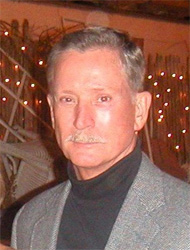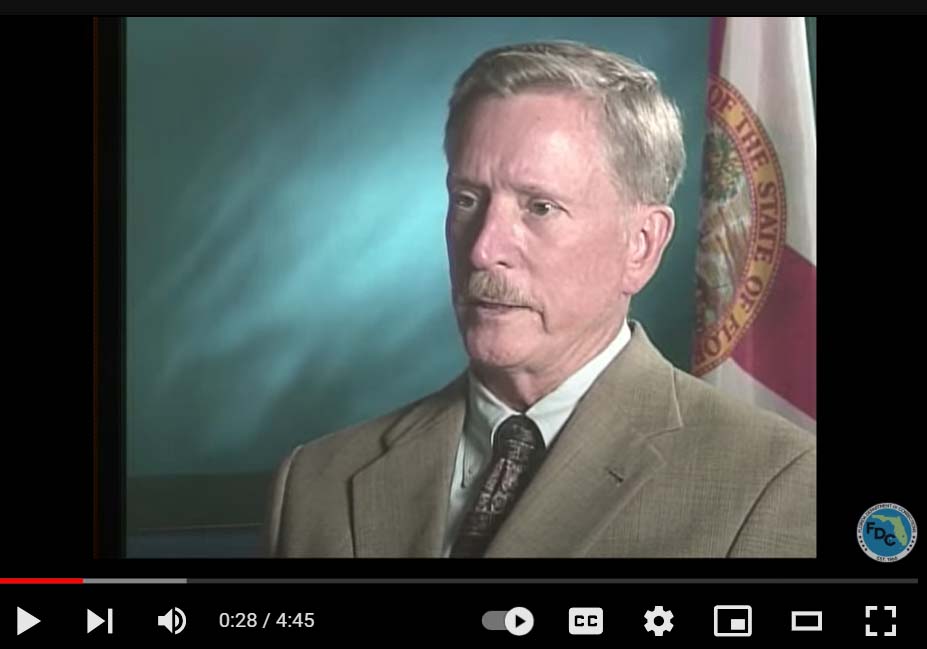2015
OFFENDER POPULATION JUNE 30, 2015
INMATES: 100,050
SUPERVISED: 139,833
INMATES: 100,050
SUPERVISED: 139,833
The Department opens five additional facilities including: Baker Re-Entry Center, Everglades Re-Entry Center, Santa Rosa Work Camp, Cross City East Unit and Okeechobee Work Camp.
Daytona Beach Work Release Center is privatized and its inmates are placed on electronic monitoring. Panama City Community Release Center conducts a pilot program expanding electronic monitoring for work release inmates housed in community release centers.
FDC’s canine tracking teams are deployed 779 times; 469 times for criminal incidents, with 172 of those involving armed individuals. Missing person searches account for 241 deployments. Many of the dogs are trained for the job as puppies. For more on how they are trained from puppyhood, visit FDC News March 2023 - YouTube
One facility receives initial accreditation while 21 are re-accredited by the American Correctional Association. To gain accreditation, a facility must achieve 100 percent compliance with the 62 mandatory standards and 90 percent compliance with the 463 non-mandatory standards. FDC facilities averaged 98.7 percent compliance during this audit period.
The Prison Rape Elimination Act (PREA) Unit continues efforts in preventing, deterring and reducing sexual victimization within FDC institutions. Twenty-six certified Department of Justice PREA audits are conducted in FY 2014–15, including 23 state institutions and three private facilities. In addition to the audits, there is a revision of policies and procedures related to PREA including the separation of male inmates who are 17 years old and under from the adult population, and enhancing video monitoring capabilities at institutions.
In addition to conducting routine field work and searches, as well as coordinating arrests with local law enforcement, Community Corrections conducts 178 Planned Compliance Initiative (PCI) operations with law enforcement agencies throughout the state. The PCI’s result in contacts with more than 5,750 supervised offenders and 381 arrests for non-compliance with conditions of supervision. Additionally, officers confiscate and transfer to local law enforcement 37 weapons, more than $30,000 in cash, stolen credit cards, burglary tools and illegal drugs including marijuana, cocaine, heroin and methamphetamines.
Offenders pay more than $32 million in victim restitution, almost $15 million in court costs and fines and more than $20 million in cost of supervision fees, which are deposited into Florida’s General Revenue Fund. Additionally, offenders perform more than 1.3 million hours of public service work for the community last fiscal year, equating to over $13 million dollars of work performed at $10 per hour.
A religious dietary program is implemented statewide in April 2015, providing inmates a reasonable opportunity to exercise their religious diet preferences through nutritionally sound menu choices. Chaplains process more than 11,000 inmate applications to participate in the program, with the aid of FDC’s Office of Information Technology, which implements a card scanning process to identify participating inmates.
FDC awards a new contract for statewide canteen operations to Trinity Services that fully implements in January 2015. The new contract includes an expanded selection of kosher food items, which can supplement the inmate Religious Diet Program. The Department also implements a pilot program at select visiting park canteens which introduces healthy choice menu items for inmates and families during visits.
FORMER SECRETARY RICHARD DUGGAR DIES

Former Secretary Richard Dugger passes away in Tallahassee on August 20, 2015. He was the second Secretary of the Florida Department of Corrections, and was largely responsible for launching the biggest prison-building program in corrections history, at a time when inmates were being housed in tents because of overcrowded conditions. Appointed by Governor Bob Martinez, he served as the second Secretary of the Department of Corrections from 1987-1991.
“Richard was born in Jacksonville, Florida on January 25, 1943, and resided in Raiford, Florida until graduation from Bradford County High School in 1961. In his words, he became a "college drop-out" in 1964 and began his career with the Florida Department of Corrections as a Correctional Officer at Florida State Prison, East Unit. In 1966, he enlisted in the U.S. Army, 20th Special Forces to begin a military career lasting 20 years.
After completing his military training, he returned to the Department of Corrections in 1967 and resumed his college studies at Florida State University. While in college, he worked part-time in the Department of Corrections, Central Office, in Tallahassee. He graduated in 1970 with a degree in Criminal Justice and went on to serve in various positions with the Department of Corrections and the Parole Commission. In 1987, he was appointed Secretary of the Department of Corrections by then Governor Bob Martinez and served in that position until 1991. Richard retired after a 30-year career in 1995. He returned to work for the Department of Corrections serving in various positions from 1999-2005 and again from 2006-2007.
Richard proudly told stories of being raised with his brother and sisters on prison grounds and the life's lessons he learned from interactions with the prisoners as a young boy. Even though Richard was retired, his heart remained with the Department of Corrections and especially the employees. Any time he saw a correctional officer in uniform, whether in a restaurant in Franklin County or a rest stop along the interstate, he stopped to talk and thank them for their service.
Richard was equally proud of his military career. He had many stories about parachuting into various countries around the world. He was most proud of completing the Army Combat Diver Program in his 40's. He retired from the Army at the rank of Sergeant Major.”
Richard was preceded in death by his parents, Lawrence and Cora Dugger; and his brother, Leonard Dugger. He is survived by his wife, Emma; his beloved dachshund, Johnson; daughters, Christy Watkins and Catie Dugger; sisters, Jean Thomas (James), Mary Stephens, and Peggy Dugger; sister-in-law, Kathy Dugger; grandchildren, Brandie, Richard, and Matt; great-granddaughter, Alyssa; and numerous nieces and nephews.www.dignitymemorial.com/obituaries
 Click here to hear Secretary Dugger say what he liked best about running the Florida Department of Corrections.
Click here to hear Secretary Dugger say what he liked best about running the Florida Department of Corrections.
Honor Flights are conducted by non-profit organizations dedicated to transporting as many United States military veterans as possible to see the memorials of the respective war they fought in Washington, FDC, at no cost to the veterans. On October 15, 2015, a "flightless" Honor Flight takes place at Sumter Correctional Institution, which allows eleven inmates who are Korean, Vietnam or Iraq War veterans to participate in a virtual tour of the nation's capital and its monuments. The event is the first of its kind to be held within a correctional institution.
Substance Abuse Treatment for inmates expands to 50 facilities and increases to 5,372 treatment slots statewide. The Department initiates outpatient substance abuse treatment services for offenders on community supervision in Circuits 9, 15 and 17, resulting in three contract awards with private treatment providers. The Department also expands Mental Health and Overlay Services to offenders on community supervision.
The FDC begins the Youthful Offender 17 and Under Program at Suwannee Correctional Institution. Licensed by Department of Children and Families as a Prevention Level Two, this program provides substance abuse prevention and education services to youthful offenders five days per week.
Through a partnership with the Department of Highway Safety and Motor Vehicles, 9,353 identification cards are issued to inmates nearing release this fiscal year. Through similar partnerships with the Florida Department of Health, Vital Statistics, and the Social Security Administration, 16,137 Florida birth certificates and 15,000 replacement social security cards, respectively, are issued to inmates nearing release in FY 2014–15.
The Mental Health Ombudsman Program is implemented. It’s the first of its kind in the nation to enhance the care and treatment of mentally ill inmates in inpatient units.
The recidivism rate for inmates drops to 25.2% (for inmates who were released in 2012), meaning for those inmates who were released in 2012, 25.2% of them returned to a Florida state prison within a three-year period.
Two inmates are executed in 2015:
- Johnny Kormondy (20 years on death row); and
- Jerry Correll (almost 30 years on death row).
- 1821-1845
- 1868-1876
- 1877-1895
- 1900-1919
- 1921
- 1922-1924
- 1927
- 1928-1931
- 1932 | CHAPMAN
- 1933-1935
- 1936-1939
- 1940-1945
- 1946-1949
- 1950-1955
- 1956-1961
- 1962 | WAINWRIGHT
- 1963-1965
- 1966-1969
- 1970-1975
- 1976-1979
- 1980-1986
- 1987 | DUGGER
- 1988-1990
- 1991 | SINGLETARY
- 1992-1995
- 1996-1998
- 1999 | MOORE
- 2000-2002
- 2003 | CROSBY
- 2004-2005
- 2006 | MCDONOUGH
- 2007
- 2008 | MCNEIL
- 2009-2010
- 2011 | BUSS
- 2011 | TUCKER
- 2012 | CREWS
- 2013-2014
- 2014 | JONES
- 2015-2018
- 2019 | INCH
- 2020-2021
- 2021 | DIXON
- 2022-Today
- Population Summary Table

